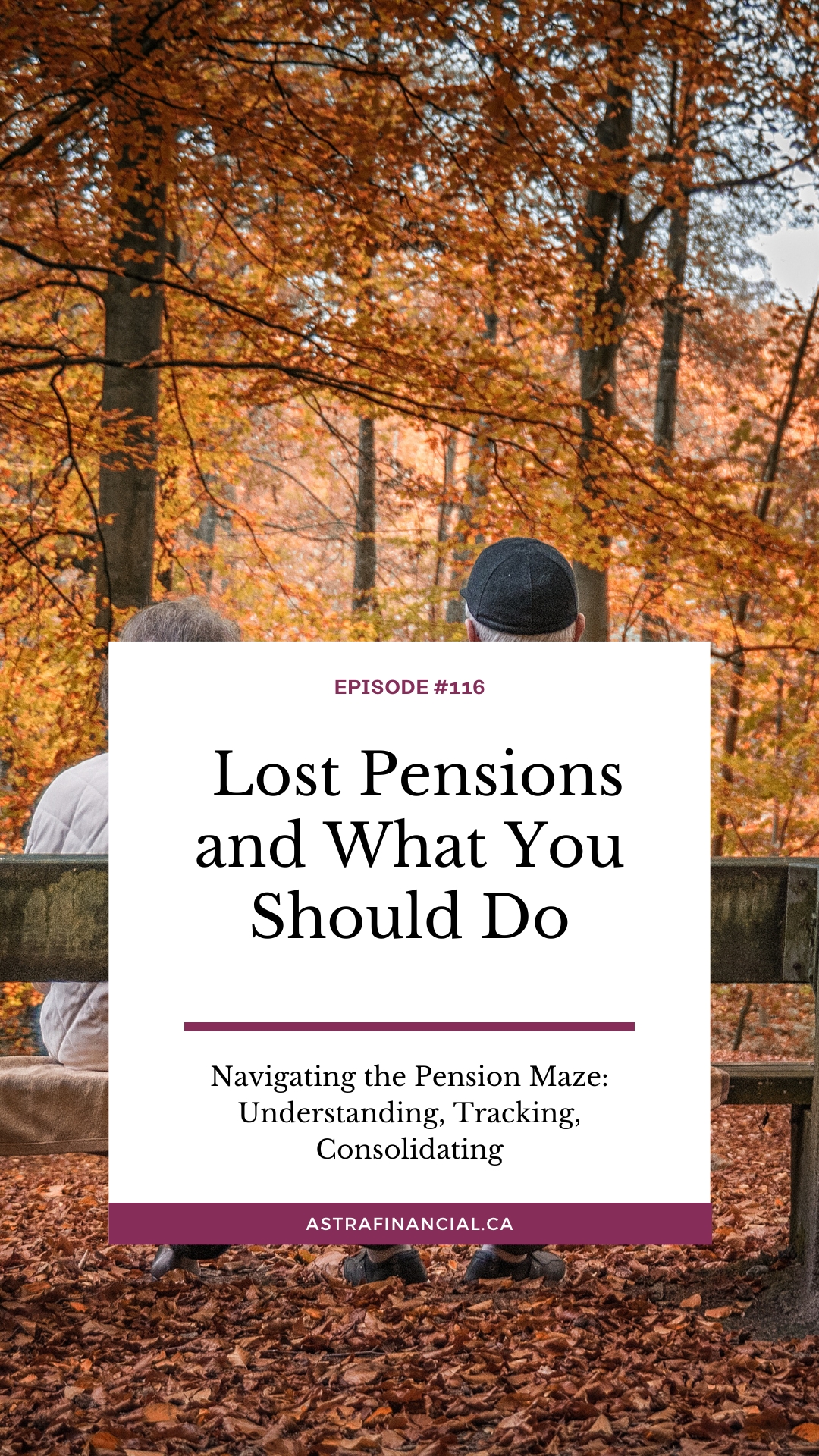Lost Pensions and What You Should Do

Ready to gain insightful secure your financial future through smart pension management? In my latest podcast episode, I’m sharing my top tips, including …
💰Educating yourself about pensions early in your career, covering contribution rates and vesting periods to make informed decisions.
💰Exploring the benefits of consolidating multiple pension accounts into one, making management simpler and more efficient.
💰Emphasizing the importance of keeping your contact information up-to-date to avoid any disruptions or losses in tracking your pension. Don’t miss out on these valuable insights! Tune in now to optimize your pension strategy and pave the way for a secure financial future.
Show Notes:
Hey there, welcome back to another episode. First and foremost, I want to express my gratitude. Thank you for listening and supporting this podcast. It always surprises me when someone sends a note expressing their appreciation for an episode or suggests a topic. It truly feels like a community, and that means a lot to me. To extend our reach further, I have a favor to ask. Please consider giving us a rating on Apple Podcasts. It greatly aids in visibility due to algorithms.
Now, onto today’s pivotal conversation. Recently, I was approached to contribute to a Globe and Mail story concerning stranded pensions. The article’s title, “Changing Jobs, Keeping Track of Pension Key as Regulator Warns of Stranded Benefits,” highlights a crucial issue. During my collaboration with the reporter, Sammy Hughes, I had an epiphany: why aren’t we discussing this on our podcast? It struck me profoundly. In Ontario alone, nearly 200,000 pension plan members have lost track of their plans, representing over 3 billion in associated benefits.
The notion of 3 billion in Ontario alone is staggering. How is such a significant amount of money misplaced? While I understand that Canadians may lose track of pensions due to transitioning between jobs and career stages, it’s imperative to explore why this occurs. By understanding the reasons behind this phenomenon, you can be proactive in avoiding it.
Furthermore, it’s crucial to learn how to safeguard your hard-earned pension, even amidst job changes or departures. One of the primary factors contributing to pension loss is transitioning between jobs multiple times throughout one’s career. Shockingly, according to data from the United States Bureau of Labor Statistics, individuals aged 18 to 52 hold an average of 12 jobs. This figure only accounts for full-time and part-time positions. Notably, job changes often continue beyond age 52, especially during retirement or shifts to contract work or entrepreneurship.
While this statistic may vary across countries, it underscores the prevalence of job hopping in modern career trajectories. Evolving workforce dynamics, job markets, and attitudes toward career mobility contribute to this trend. Consequently, the risk of losing track of pensions escalates, potentially leading to unclaimed or forgotten funds.
To mitigate this risk, it’s essential to stay informed and educate oneself about pension plans early on in one’s career. Starting a new job presents an opportune moment to familiarize oneself with the company’s pension plan. If you’re a parent or grandparent, consider imparting this knowledge to younger generations who may lack awareness about pensions. Educating them about contribution rates and vesting periods can empower them to track their pensions effectively.
Additionally, maintaining organized records of pension details is crucial. Whether digitally or in hard copy, retaining documentation of employer pension information ensures clarity and accessibility.
And usually, at minimum, you’ll receive an annual statement of your pension, or most likely, you’ll have online access. When you sign up for that, they’ll guide you through the steps to set up that online access so you can track it anytime and watch it grow.
I will say, the most common way to lose track of the fact that you even have a pension is when you’re bombarded with emails nonstop, and it becomes just another task to do. So, keep records, set up that online access, and maintain detailed records of your employment history. Keep a folder. Every time you change a job, include the date of employment, the pension plan details, and contact information for the pension administrators. This will assist you over time, and you only have to document it once while you’re likely to be at that job for a significant period. Start a spreadsheet and keep track of it.
The third tip I have for you to avoid losing track of your pension is to consolidate if possible. Consider consolidating multiple pension accounts into a single plan. Another term for this is “porting a pension.” If you have a defined benefit pension at one job and move to another job with a similar pension, you can transfer your previous pension into the new one. This simplifies your life and keeps everything in one place. Each time you move, explore the possibility of consolidating your pensions into your new plan.
Another crucial step is to update your contact information. Sometimes, if you move or change your email address without notifying your employer or the pension fund, miscommunications can occur. This could result in you no longer receiving emails with your annual pension statements, causing you to forget about your pension. Ensure that your contact information is up to date to avoid this issue.
Lastly, if in doubt, seek professional advice from a certified financial planner. They can help manage your pensions, keep records for you, and provide tailored advice based on your financial situation. They serve as your financial concierge, guiding you through the complexities of pension management.
Now, let’s address what to do if you suspect you’ve forgotten about a pension from a previous job. Firstly, review your past employment records. Check tax returns, old pay stubs, and any available files for information about previous employers and pensions. Then, reach out to your former employer directly to inquire about any pension benefits you may be entitled to. Provide them with your personal details and dates of employment to facilitate the search for your pension records.
If you’re unable to locate your pension through your former employer, consider contacting the pension administrator directly. They may be able to assist you in accessing any previous pensions you may have forgotten about.
As a last resort, check your provincial pension registries for unclaimed pensions. Some provinces in Canada have databases where you can search for unclaimed pensions. If your name appears in the registry, you may have a stranded pension waiting to be claimed.
Finding and managing a forgotten pension may require time and effort, but don’t lose hope. Keep researching and following up on leads until you locate your pension. Remember, this is your hard-earned money, and it’s essential to ensure it’s not left unclaimed.
The key takeaway is to work with your financial planner. They can help organize your financial life, consolidate your pensions, and ensure your money is working for you. With their assistance, you can navigate the complexities of pension management and secure your financial future.
If you have any questions, feel free to reach out to me at [email protected].
Take care.




